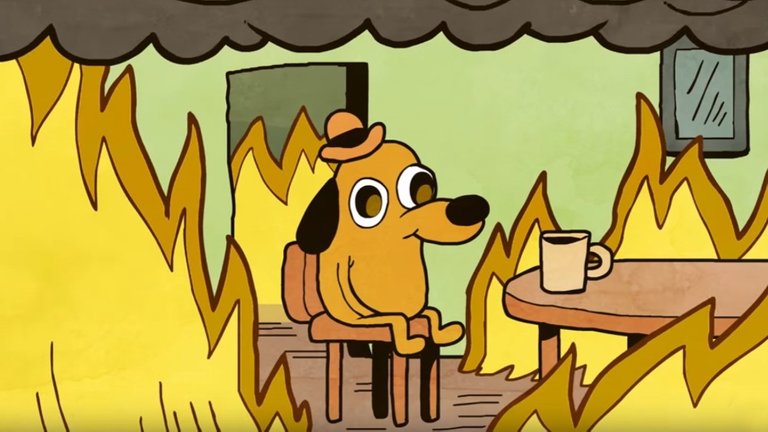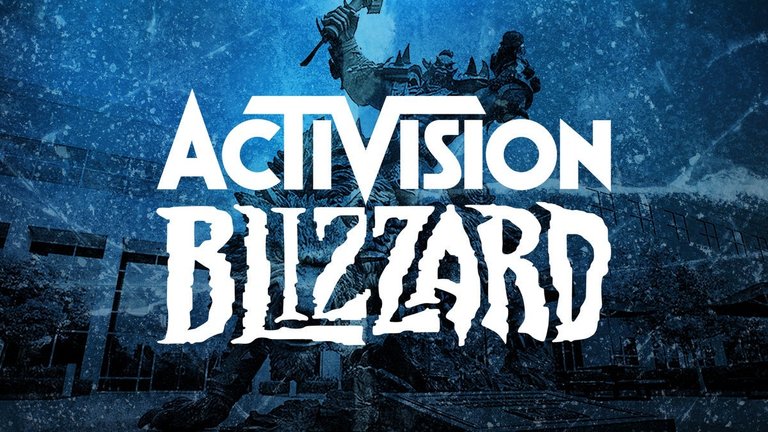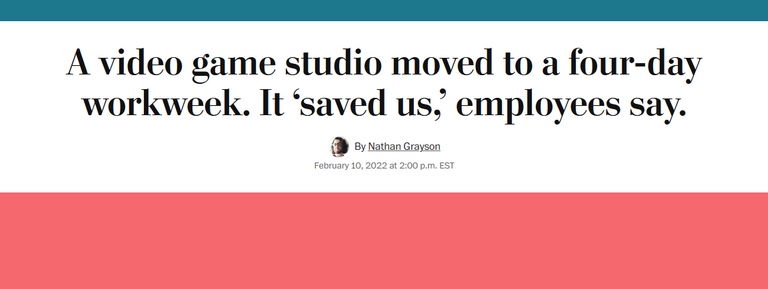Thanks for clicking! English version below
Source

Cada cierto tiempo suelen salir a la luz temas o debates que yo doy por terminados, pienso que estan muertos y enterrados en un argumento definitivo pero los eruditos en Twitter siempre me demuestran lo contrario, uno de esos temas que involucraban al videojuego resulto ser el viejo Crunch y su practica en una serie de estudios Top, ya a estas alturas repito, el debate deberia estar mas que cerrado sobre todo cuando hablamos de abuso de horas de trabajo y una organizacion deficiente pero aqui les va un post sobre crunch, una practica que no se limita solo a la industria del videojuego pero que debido a su naturaleza, particularmente los periodos largos de desarrollo y las fechas de lanzamiento poco realistas sus trabajadores son mas propensos a recibir, tarde o temprano, su dosis de crunch.
Empecemos por definir de manera especifica lo que es Crunch, imagina que trabajas en un estudio devideojuegos, eres el diseñador encargado de hacer los niveles en una seccion especifica del juego, en el contrato que tu y el estudio firmaron estipulan los detalles de esta asociacion, el dinero que vas a ganar, confidencialidad y tambien algo muy importante: las horas que vas a trabajar.
Ahora digamos que un dia normal, en donde estas a punto de terminar de trabajar las horas que te corresponden ese dia tu jefe, motivado por las nuevas exigencias de los inversionistas, te pone a ti y a todo el departamento de diseño a trabajar unas horas extra para asi terminar algunos diseños o agregarle un nuevo contenido no programado al juego, algo de rutina en los desarrollos de hoy en dia, y ahi surge la interrogante ¿te quedarias?, todo tu departamento se esta quedando a trabajar duro asi que ¿por que tu no?, decides quedarte. Felicidades acabas de entrar en la espiral del crunch, una de muchas que los estudios han usado a lo largo de la industria.
Vamos con un termino mas concreto para que quede claro:
El crunch es una práctica comúnmente utilizada por los estudios de videojuegos en la que hacen trabajar a sus empleados por encima del tiempo estipulado para alcanzar a cumplir las fechas de entrega
Lo cierto es que el crunch es mucho mas complicado que solo tu jefe pidiendote que trabajes horas extra, es mas bien la normalizacion de estos periodos extra y construir alrededor de ellas una particular "cultura" en donde muy pocos trabajadores se animaban a alzar la voz frente a estos cambios de timon por parte de sus jefes, aqui debo decir que trabajar horas extra no es el verdadero mal, de hecho no veo mal hacerlas, mi problema esta cuando se amplian jornadas de trabajo indefinidamente de cara al lanzamiento de algun juego (normalmente AAA) producto de la falta de organizacion y las malas practicas de los superiores, no nos engañemos, el crunch esta desde el mismisimo inicio del videojuego y es poco probable que se pueda eliminar por completo pero si hay formas de haerlo mas visible y mitigarlo.
Prueba de ello son los diferentes esfuerzos de los trabajadores, los estudios y la prensa en la ultima decada, el videojuego se ha convertido en una industria multimillonaria que mueve miles de puestos de trabajo y con ello cada vez mas desarrolladores van alzando la voz sobre algunas condiciones de trabajo inadecuadas, el entorno AAA es comun ver este tipo de practicas anexionando esa cultura del crunch al flujo habitual del estudio. Trabajos como The Last Of Us, Red Dead Redemption 2 o Cyberpunk han sido el foco de varias problematicas con trabajadores quemados hasta el punto de trabajar durante 6 dias en jornadas escandalosas para entregar el juego en la fecha pautada, los juegos que nombre son hechos por algunos de los estudios mas importantes del videojuego asi que ya se pueden imaginar cual es la situacion de la problematica.
Activision Blizzard ha sido otra de las desarrolladores que han recurrido activamente al crunch para explotar a sus trabajadores y terminar sus titulos lo antes posible, de hecho la saga millonaria de Call Of Duty recibia con cada entrega una nueva carga de trabajo extra no deseado incluso captando la atencion del Washintong Post que publico un articulo proponiendo la reduccion de la semana laboral a 4 dias a raiz de unas declaraciones de una ex directiva de Activision sobre como "trabajaban 14 horas al dia", algo seguro es que Xbox debera estar atacando estos ambientes con la compra de la desarrolladora, pero otro que preocupa y bastante es el ambiente laboral de Ubisoft que ha llegado tan lejos como para reportar abusos a trabajadoras, ambientes sexistas y hasta pagar bonos por callar voces criticas de las practicas del estudio.
Recientemente hay una nueva polemica inclucrando el crunch en los estudios modernos ya que Bethesda, uno de los grande estudios que se encuentran desarrollando el videojuego Starfield ha sido acusada por varios empleados por practicas que podrian considerarse crunch, no solo con este nuevo desarrollo en proceso sino tambien por la produccion de otro juego, Fallout 76 que se vio envuelto tambien en estas practicas anterior a la reciente compra del estudio por Microsoft, varios ejecutivos de Bethesda ya apuntaron que a pesar de que las declaraciones sobre Fallout 76 eran producto de la mala organizacion en su mas reciente desarrollo, Starfield no se observaban ni se contempla que haya practicas similares al crunch pero fue mas alla para justificar estas practicas alegando que "antes hacer crunch era honorable".
El abuso nunca ha sido honorable
¿Hay alguna solucion a la vista?
El hecho es que ha habido progresos con la masificacion del videojuego, aunque los desarrollos se van haciendo cada vez mas grande lo cierto es que hay estudios y nuevas reglamentaciones que estan haciendo del crunch un mal del que poco a poco somos mas conscientes, no me voy a elevar demasiado y decir que el crunch dentro de unos años estara eliminado, el crunch, para bien o para mal, seguira existiendo mientras haya videojuegos, pero han habido distintas propuestas y estudios que son de lo mas interesante y creo que pueden ayudar a reducir el impacto que tienen estas jornadas laborales extra en los trabajadores.
Jornadas Laborales mas flexibles, un espacio para que los trabajadores denuncien y pongan en practica sus derechos en el medio, se ha hablado incluso de un sindicato que reuna y vele por los derechos de los trabajadores de la industria, todo esto se viene desarrollando en parte gracias a que conocemos el mal y lo queremos combatir, tambien no esta de mas destacar lo que hacen ciertos estudios para crear espacios de trabajo mas saludables por ende mas productivos, a ellos son los que debemos darles las riendas de la industria del mañana y espero poder ver un mejor trato a los desarrolladores de este sector.
English
Every now and then issues or debates usually come to light that I take for over, I think they are dead and buried in a definitive argument but the scholars on Twitter always show me otherwise, one of those issues involving the video game turned out to be the old Crunch and its practice in a number of Top studios, by now I repeat, the debate should be more than closed especially when we talk about abuse of working hours and poor organization but here is a post about crunch, a practice that is not limited only to the video game industry but due to its nature, particularly the long development periods and unrealistic release dates its workers are more likely to receive, sooner or later, their dose of crunch.
Let's start by defining specifically what is Crunch, imagine you work in a game studio, you are the designer in charge of making the levels in a specific section of the game, in the contract that you and the studio signed stipulate the details of this partnership, the money you are going to earn, confidentiality and also something very important: the hours you are going to work.
Now let's say that a normal day, where you are about to finish working the hours that correspond to you that day your boss, motivated by the new demands of investors, puts you and the entire design department to work some extra hours to finish some designs or add a new content not programmed to the game, something routine in today's developments, and there arises the question would you stay?, all your department is staying to work hard so why not you?, you decide to stay. Congratulations you have just entered the crunch spiral, one of many that studios have used throughout the industry.
Let's go with a more concrete term for clarity:
Crunch is a practice commonly used by video game studios in which they make their employees work over time to meet deadlines.
The truth is that the crunch is much more complicated than just your boss asking you to work overtime, it is rather the normalization of these extra periods and build around them a particular "culture" where very few workers were encouraged to raise their voices against these changes of helm by their bosses, here I must say that working overtime is not the real evil, In fact I do not see wrong to do them, my problem is when working hours are extended indefinitely in the face of the launch of some game (usually AAA) product of the lack of organization and bad practices of superiors, let's not fool ourselves, the crunch is from the very beginning of the game and is unlikely to be eliminated completely but if there are ways to make it more visible and mitigate it.
Proof of this are the various efforts of workers, studios and the press in the last decade, the video game has become a multi-billion dollar industry that moves thousands of jobs and with it more and more developers are raising their voices about some inadequate working conditions, the AAA environment is common to see such practices annexing that crunch culture to the usual flow of the studio. Works like The Last Of Us, Red Dead Redemption 2 or Cyberpunk have been the focus of several problems with workers burned to the point of working for 6 days in outrageous days to deliver the game on time, the games I name are made by some of the most important video game studios so you can imagine what is the situation of the problem.
Activision Blizzard has been another developer that has actively resorted to crunch to exploit their workers and finish their titles as soon as possible, in fact the million dollar saga of Call Of Duty received with each installment a new load of unwanted extra work even catching the attention of the Washintong Post who published an article proposing the reduction of the work week to 4 days following statements from a former Activision executive about how they "worked 14 hours a day ", one thing for sure is that Xbox must be attacking these environments with the purchase of the developer, but another concern is the work environment at Ubisoft which has gone so far as to report abuse of workers, sexist environments and even pay bonuses for silencing voices critical of the studio's practices.
Recently there has been a new controversy involving crunch in modern studios as Bethesda, one of the big studios developing the Starfield video game has been accused by several employees for practices that could be considered crunch, not only with this new development in progress but also for the production of another game, Fallout 76 which was also involved in these practices prior to the recent purchase of the studio by Microsoft, several Bethesda executives have already pointed out that although the statements on Fallout 76 were a product of poor organization in its most recent development, Starfield was not observed nor is it contemplated that there are practices similar to crunch but went further to justify these practices claiming that "crunching was honorable before".
Abuse has never been honorable.
Is there any solution in sight?
The fact is that there has been progress with the massification of the video game, although the developments are becoming increasingly large what is certain is that there are studies and new regulations that are making the crunch an evil that little by little we are more aware, I will not get too high and say that the crunch in a few years will be eliminated, the crunch, for better or worse, will continue to exist while there are video games, but there have been various proposals and studies that are most interesting and I think they can help reduce the impact they have these extra working hours on workers.
More flexible working hours, a space for workers to denounce and put into practice their rights in the middle, there has even been talk of a union that brings together and ensure the rights of workers in the industry, all this is being developed in part because we know the evil and we want to fight it, also it is not superfluous to highlight what certain studies do to create healthier workspaces therefore more productive, they are the ones we should give them the reins of the industry of tomorrow and I hope to see a better treatment to developers in this sector.

Yeey you made it to the end of the post :) thanks for joining me today!






A pesar de que la industria del videojuego ha avanzado a pasos agigantados estas últimas décadas, la tóxica cultura de trabajo alrededor de la producción de la mayoría de los videojuegos (O al menos aquellos que toman más prominencia, tanto blockbusters cómo indie titles) son una prueba viviente de lo mucho que nos falta evolucionar, hay demasiados factores que influyen de forma directa o indirecta y espero que eventualmente estos días queden atrás, ejecutivos de grandes empresas presionando a los equipos de desarrollo, los fans obsesionados con las fechas pautadas imposibles de cumplir, etc... Debemos abandonar todo esto.
Wow no sabia nada de este tema pero viendo este post me exploto la cabeza, la verdad hay mucho que decir sobre el crunch leyendo esto me puse a pensar mucho sobre el tema, saludos :).
So let me start off by saying I enjoyed your article, but when people talk about crunch times they often get it wrong, or just think that it is explotiation of the devs, which isn't really the case.
Let me start off by saying I took a year of Video Game Design and Development ( it was a two-year course but dropped out after a year due to the colleges reputation) and we learned a lot about the video game industry.
Crunch time is needed and will never be rid of. The most often use of "crunch" time is near the end of the development cycle and the last few weeks leading to launch. Everyone is trying to get all the bugs worked out and make sure the game ships in a working state.
The Crunch time can be brutal with devs working for days to get the product ready for launch, but this is what devs signed up for.
Let me clarify some more.
The video game industry is one of the industries that offers the most perks to it's employees. Most triple A companies offer things like food on site, free access to their gym, etc. And they're also the ones who offer one of the greatest amount of paid vacation a year, with the triple A studios usually offering 6 weeks paid vacation a year, and smaller studios offering 4. This is because working in the video game industry can be stressful, especially during crunch times.
When it comes to crunch time, every dev, or even every college student looking to become one will learn about the horrors and what to expect from it. There's a couple of dirtbag companies out there that will try to nickle and dime their employees anyway they can, but to think that the majority of companies are out there to screw over their employees or that "crunch" time is unfair, or completely unexpected is wrong.
Siempre se ha tratado de una falta de organización brutal. Se alaba como una muestra de dedicación, y lo contrario es pereza. Pero alguien que vive trabajando no tiene capacidad mental para aprovechar el tiempo, son empleados más caros y menos productivos.